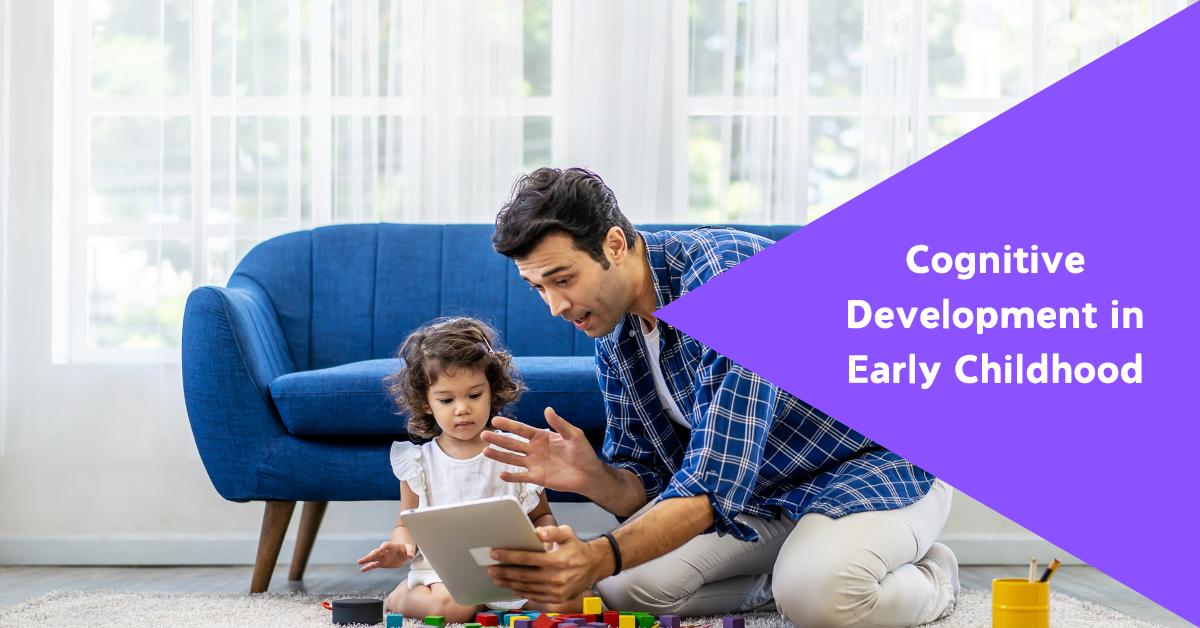Cognitive development in early childhood refers to expanding a child’s ability to think, understand and make sense of the world. Generally, from birth to around seven years of age, this critical period shapes a child’s intellectual foundation.
During this time, children undergo rapid mental growth developing skills that are essential for future learning, problem solving and decision making.
Understanding Piaget’s Stages of Cognitive Development
Swiss psychologist Jean Piaget’s theory of cognitive development provides a framework for understanding how children think and learn. According to Piaget, children move through a series of stages as they interact with their surroundings. In early childhood, two key stages of Piaget’s theory are followed:
Sensorimotor Stage (Birth to 2 years)
In this stage, kids learn about the world primarily through sensory experiences and motor activities. Children engage with their environment by touching, grasping and observing. This realization marks the beginning of memory development and the ability to form mental images.
Preoperational Stage (2 to 7 years)
The preoperational stage is characterized by the emergence of symbolic thinking where children use words, images, and objects to represent other things. Language acquisition grows significantly during this period and children engage in imaginative play.
However, they often have difficulty seeing things from perspectives other than their own. Logical reasoning is still underdeveloped and their thought processes tend to be more intuitive.
Key Cognitive Milestones in Early Childhood
Several critical cognitive developments occur during early childhood. They are listed below:
Language Development
One of the most striking cognitive advancements is the rapid development of language. Children go from speaking a few words at 2 years of age to forming complex sentences by 5 years of age.
This leap in linguistic ability enhances their ability to communicate, express thoughts and comprehend others. It also serves as a foundation for future academic skills such as reading and writing.
Memory and Recall
As children grow, their ability to store and retrieve information improves dramatically. They begin to form memories of people, places and experiences, which plays a crucial role in learning and understanding their environment.
Problem Solving and Logical Thinking
Children’s problem-solving abilities evolve significantly during this period. They learn to recognize patterns and apply simple logic to solve everyday problems. While their reasoning is not yet fully developed, this stage lays the groundwork for future analytical skills.
Imagination and Symbolic Play
Cognitive development in early childhood is also marked by an explosion of creativity. Children engage in imaginative play where they pretend to be different characters or recreate scenarios.
This type of play allows them to experiment with ideas, express emotions and understand social roles, fostering both cognitive and emotional growth.
How to Foster Cognitive Development?

Parents, caregivers and educators play an essential role in nurturing cognitive development. Creating a rich and stimulating environment encourages curiosity and exploration which are essential for cognitive growth. Here are some effective strategies for fostering cognitive development:
Read Regularly
Reading books to young children helps them expand their vocabulary, improve language comprehension and develop a love for stories and learning. Engaging with picture books and asking children to predict what will happen next also strengthens memory and reasoning.
Playing Games that Encourage Thinking
Puzzles, building blocks and other educational games are excellent tools for enhancing problem solving skills and spatial awareness. Simple board games that involve counting, taking turns or making decisions also nurture logical thinking.
Encourage Imaginative Play
Providing children with opportunities to engage in pretend play enhances their creativity and ability to think symbolically. Dressing up, playing with dolls or using toys to act out scenarios fosters cognitive and social development.
Ask Open-Ended Questions
Engaging children in conversation by asking questions that require more than a yes-or-no answer encourages them to think critically, reflect and express their thoughts.
Conclusion
Cognitive development in early childhood is a transformative process that lays the groundwork for future learning. By providing opportunities for exploration, problem solving, and imaginative play, parents can help children build strong cognitive skills that will support their academic success and intellectual curiosity throughout life.
Why choose KidsCur?
KidsCur provides all the medical information of children in one platform. We offer end to end encrypted data, provides expert doctor’s advice and makes the medical process easy. Contact us to learn more about our services and gain valuable information.



